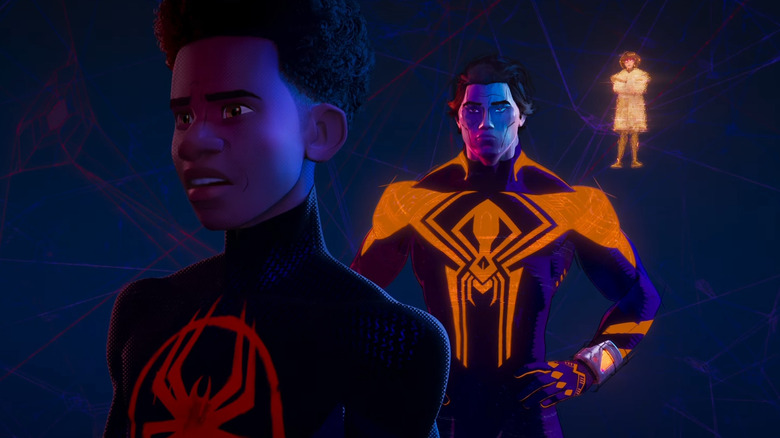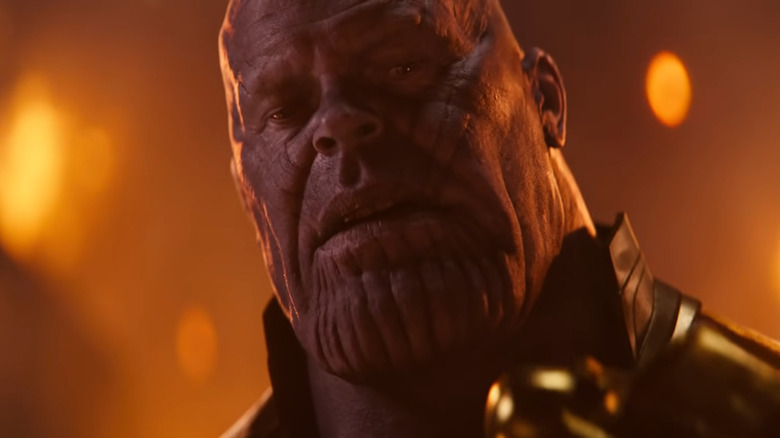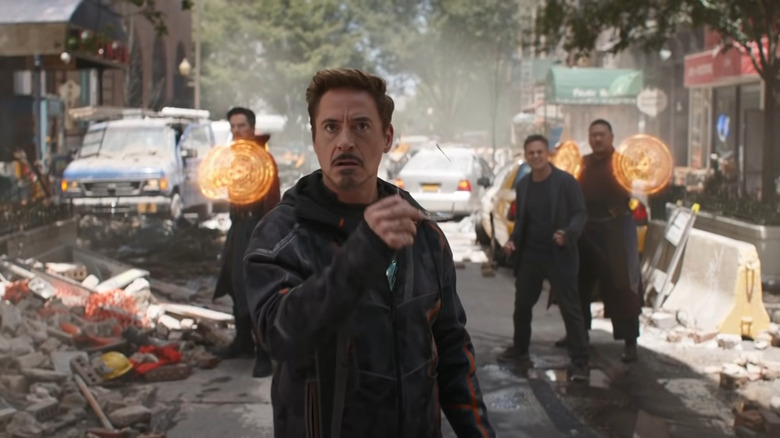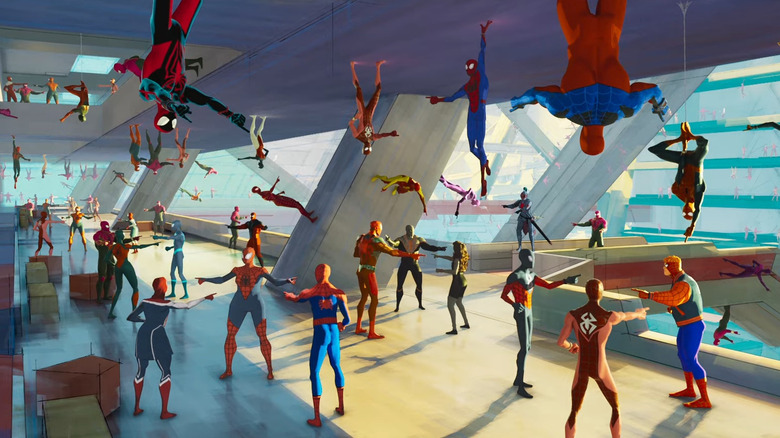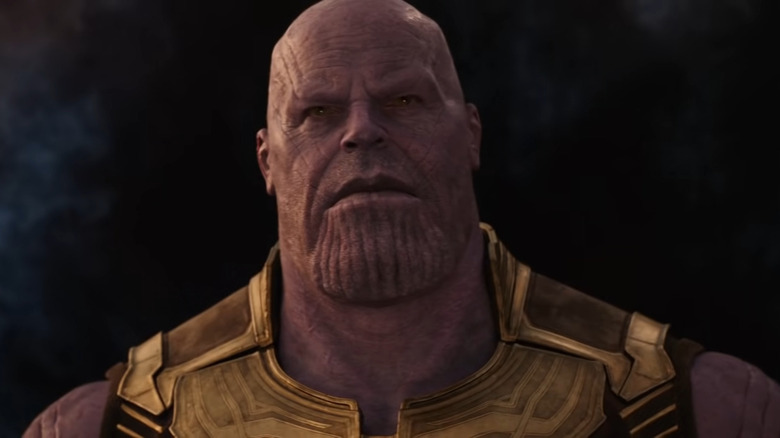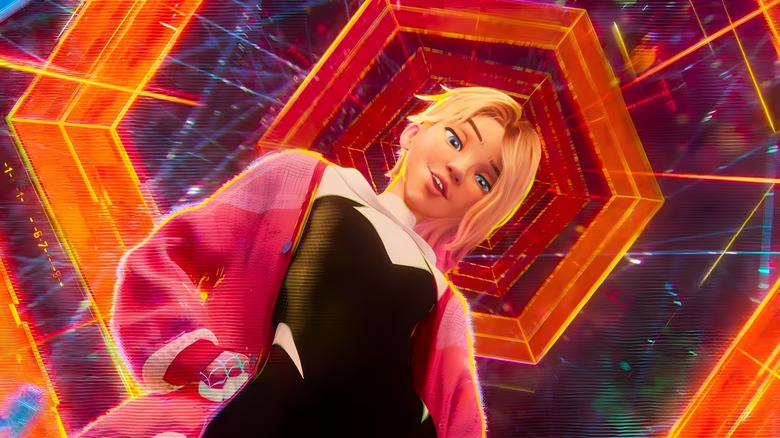Spider-Man: Across The Spider-Verse And Fast X Make The Same Mistake In Their Third Acts
Contains spoilers for "Spider-Man: Across the Spider-Verse" and "Fast X"
Let's make one thing clear: "Spider-Man: Across the Spider-Verse" is a near-perfect sequel that somehow manages to exceed its exceptional predecessor (as well as the sky-high expectations it set) and more than deserves to be uttered in the same breath as "The Dark Knight," "The Empire Strikes Back," and Sam Raimi's "Spider-Man 2." On just about every level, it's a staggering artistic achievement. That is almost more impressive when you take into account that it makes the same, disappointing mistake as its creative polar opposite, "Fast X."
We don't need to go too far into the obvious differences between the two films here — how one capitalizes on past success to take further dramatic risks, while the other merely spins its wheels with frustrating self-satisfaction. Yet, in the tradition of summer franchise "event films," they both choose to end on relatively unsatisfying cliffhangers.
Though the "Harry Potter" franchise pioneered the lucrative (but artistically dubious) two-part blockbuster, it was 2018's "Avengers: Infinity War" that proved their potential. "Endgame" was always going to be immensely successful, but its cultural impact was arguably magnified by the unparalleled build-up created by the devastating cliffhanger at the finale of "Infinity War." Yet, as "Fast X" and "Across the Spider-Verse" attempted to recreate this effect, they both forgot the three key aspects of what made the "Infinity War" finale truly great.
1. Avengers: Infinity War breaks its franchise's only rule (while Spider-Verse and Fast X still play by theirs)
Though the term is largely subjective, both "Fast X" and "Across the Spider-Verse" have endings that could be called "unexpected." The reveal that Miles Morales (Shameik Moore) has inadvertently sent himself to the very universe he robbed of a Spider-Man is skillfully established but still delightfully surprising when it occurs. Meanwhile, the plane crash and subsequent explosion at the Hoover Dam in "Fast X" is ... well, its certainly something, but it arguably meets the base criteria for being "unexpected" (in the same way a car crash is "unexpected" by the shallow virtue of randomness alone). However, neither film shows the same commitment to subversion as "Infinity War."
In a Marvel Cinematic Universe film, anything can happen except for one event. Characters can be killed, enemies can become allies, and heroes can be brought back from the dead. The one thing that absolutely couldn't happen — and didn't happen for 18 preceding films and hasn't again for the 13 that have come after — is the heroes losing. Not merely losing their life or making the wrong choice, but failing to prevent the villain's plans of global destruction in a decisive and irreversible way (yes, "Endgame" does complicate the "irreversible" part, but we'll get to that in a moment).
In the "Fast & Furious" universe, however, characters are killed and revived ad nauseam, to the point that it's hard to buy any death, no matter how sacrificial or tragic (read: cloying). Even harder still is generating any feelings of surprise or tension for much longer than a second after these "deaths" occur. "Across the Spider-Verse" arguably breaks none of its core rules to create tension, but simply sets up the next installment of Miles' increasingly strange journey. While the avoidance of such drastic subversion is by no means a mark on the story in and of itself, it does bring us to our next missed opportunity.
2. Thanos' victory made the future uncertain (but it seems clear where Spider-Verse and the Fast franchise are headed)
While "Avengers: Endgame" does undo the apocalyptic finale of "Infinity War," that doesn't change the fact that audiences left the theater in 2018 without knowing how the situation could be undone. Of course, Marvel Studios wasn't going to axe over 50% of its ensemble — especially when most of them had sequels already in production — and yet they simulated a feeling of permanence for the audience as they walked out of the theater by providing no clear path ahead for the heroes.
While the mechanics of time travel were long hinted at and subtly established in the MCU, "Infinity War" avoided turning it into an obvious solution. Even if the audience were to guess that the heroes could simply travel back in time, they wouldn't be sure how until at least "Ant-Man and the Wasp." That feeling of permanence and uncertainty is largely responsible for why the ending of "Infinity War" received the response it did.
Unfortunately, the endings of "Fast X" and "Across the Spider-Verse" are less opaque. We've already touched on how death and danger are easily avoided in the "Fast & Furious" franchise, but "Across the Spider-Verse" surprisingly pretty much spells out the narrative thrust of its impending sequel by revealing a bit too much in its final moments. Perhaps if the film had omitted Gwen's (Hailee Steinfeld) reconciliation with her father, the gifting of Spider-Punk's (Daniel Kaluuya) watch, as well as the return of the first film's heroes, and had ended instead on the revelation that Miles was sent to Earth-42, the future would be less obvious. That said, all of that was included for an understandable reason — one that proves the film's storytelling skills and rounds out why "Infinity War" worked so well.
3. Infinity War tells a complete story (meanwhile, Spider-Verse and Fast X feel purposefully incomplete)
The creative team behind the "Spider-Verse" series is second to none, and there's no better evidence to support this claim than the fact that — despite the somewhat frustrating cliffhanger — they still give both Miles and Gwen definitive, satisfying character arcs. By including everything stated above — yes, even the reformation of her Spider-Team — the story confirms Gwen's growth and answers the central dramatic question it asks at the top of the film. For Miles, there's no better ending to his quest to "do both" than to be stranded on an Earth where he can do nothing at all — one that shows the seemingly irreparable damage caused by his existence and actions. But while Gwen and Miles get entertaining and relatively fulfilled stories, no other character does.
Supporting players like Peter B. Parker (Jake Johnson), Miles' parents, and the colorful new Spider-Friends the heroes meet along the way remain more or less static. This would be more forgivable if the film didn't abandon its antagonists — Oscar Isaac's Miguel O'Hara / Spider-Man 2099 and Jason Schartzman's The Spot — in the middle of their respective journeys. While there are certainly at least two strong, complete arcs within "Across the Spider-Verse," it's difficult to call the film a complete story.
Expecting solid character arcs in a "Fast" film is like waiting for rain in a drought: useless and disappointing. And yet, even by its own standards, "Fast X" defies basic narrative concepts such as character growth, resolution, set-up, and pay-off so flagrantly that it borders on offensive, and is consequently not worth discussing at length. But to leave "Across the Spider-Verse" without that euphorically cathartic resolution provided by the first film was a surprisingly colossal letdown.
Across the Spider-Verse leaves loose threads that Infinity War didn't
By contrast, "Infinity War" can arguably be enjoyed as a standalone film because each character gets a complete journey that ties directly into the film's central theme of sacrifice. This is especially true for Thanos, whose arc is so well defined that a sound argument could be made that he is, at least from a screenwriting perspective, the film's true protagonist.
But while he and franchise co-stars Tony Stark (Robert Downey Jr.) and Steve Rogers (Chris Evans) receive a majority of the attention, even less central figures like Thor (Chris Hemsworth), Star-Lord (Chris Pratt), and Doctor Strange (Benedict Cumberbatch) are given fleshed out character arcs complete with conflicting wants and needs, difficult lessons learned, and consequences that affect the future of the story. There is no equivalent to, say, Spot lingering over Brooklyn or Miguel still trying to track down Miles.
Even though it ends with all but one of its subjects in a worse place than they started, "Infinity War" leaves not a single character in a moment of conflict. "Across the Spider-Verse," on the other hand, does so with the near entirety of its cast. For any other film, this would be a dire misstep — but "Across the Spider-Verse" isn't just any film.
Across the Spider-Verse is still nothing short of amazing
To put it simply, there is too much about "Across the Spider-Verse" that works for it to unravel at the end. From the dizzying showcase of artistic diversity and versatility to the relentless, pulse-pounding pace, stellar performances, consistently effective jokes, and pretty much every aspect of its creation, it's a largely unimpeachable masterpiece.
What's more, the writing across the board is so strong, careful, and efficient that it deserves a pass for having a relatively unsatisfying cliffhanger ending. Where "Fast X" manufactures a cheap moment of danger to prolong an egregiously thin story, "Across the Spider-Verse" makes a decisive argument for the length of this two-part epic. So much so that, were it not released in two parts, a five-hour film with the contents of both installments would probably be highly enjoyable. When "Beyond the Spider-Verse" releases next year, audiences should have faith that there will be pay off for everything set up by this film and — without forcing the audience to wait so long to see what happens next — any loose threads hanging at the end of "Across the Spider-Verse" will retroactively be forgiven.
But that doesn't change the fact that Hollywood needs to do its due diligence to understand why "Infinity War" worked before attempting to replicate it just for the sake of hype. Not every film is "Across the Spider-Verse" — in fact, pretty much no film is "Across the Spider-Verse" — and for every story that fails to meet such dizzying standards in the hours leading up to its obligatory cliffhanger, no amount of "surprise" will be able to save them from falling apart completely.
